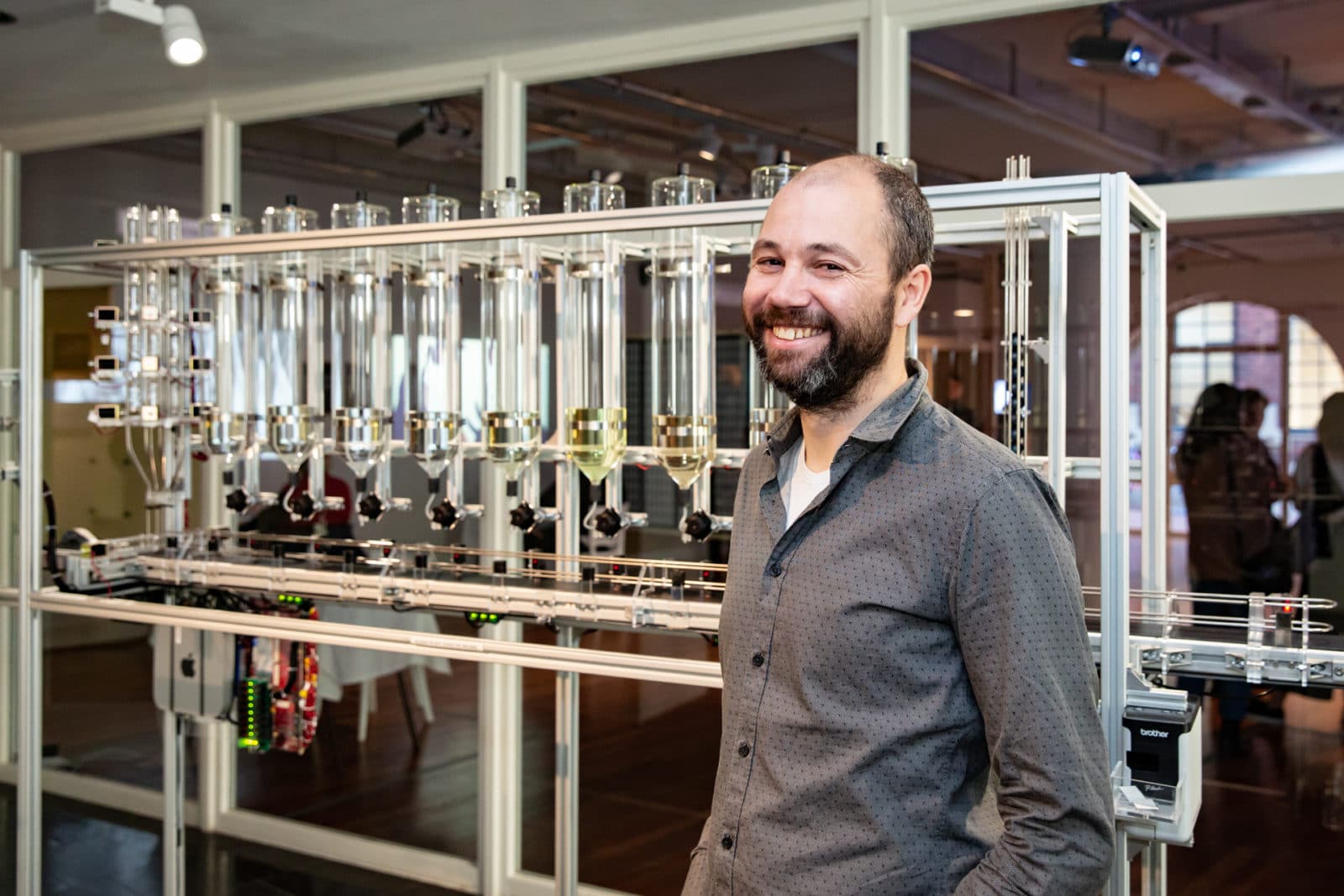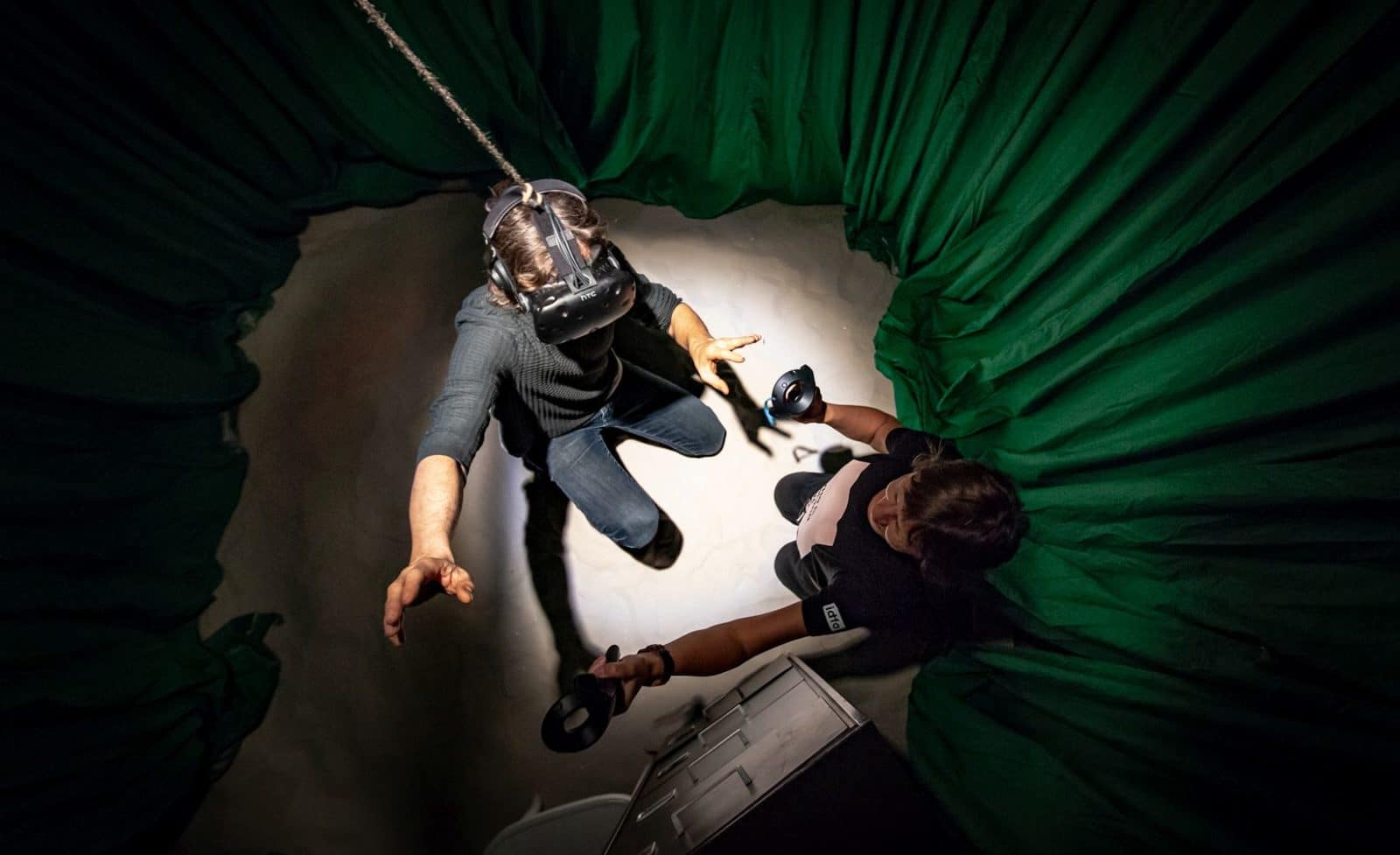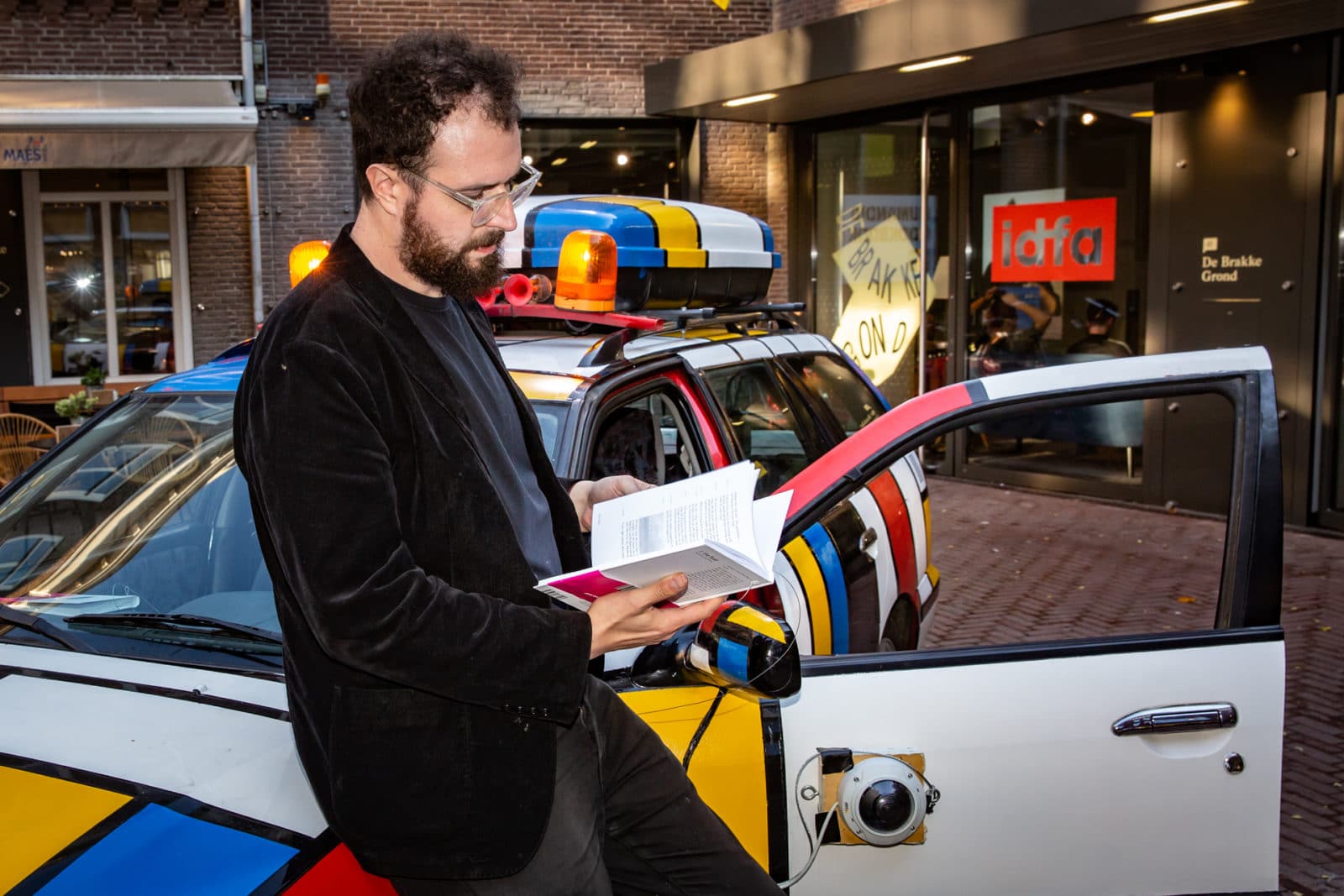'It was seven minutes to ten o'clock in the morning, and it was the only good thing that had happened. What is it? the painter asked.'
These are the first lines of 1 the Road, the account of a journey in the footsteps of Jack Kerouac. It is the first book written by an artificial intelligence (AI), say a robot, bot for short. This project by Ross Goodwin - more on this later - is a standout feature at the twelfth DocLab, the now permanent part of the IDFA documentary festival. A testing ground and playground where artists explore how to tackle reality with new media and digital technology.
That concept of reality, by the way, is to be understood broadly at DocLab. There are, of course, the already almost traditional web documentaries, such as Tatsuniya, by Rahima Gambo about Nigerian students under the brutal threat of Boko Haram. Or a Virtual Reality production like The Industry VR, which takes you around the illegal world of the Dutch drug industry. But DocLab also presents, to name a few, a perfume shop, immersive theatre, playing with food, a VR Sufi ritual, interactive dinner parties, an audio walk and Die With Me. The latter is a chat room for smartphone users who only have a battery life of 5% or less. Creator Dries Depoorter got the laughs with this.
What's the latest? What are the trends?
It is Thursday 15 November, five minutes past 11 in the morning. Caspar Sonnen, head of IDFA DocLab, casually lets slip at the press presentation that there is nothing new in the last three years in terms of technology. Even Virtual Reality (VR) and its successors like XR and AR are already quite natural.
Initially, DocLab was mainly a stage for the latest media and digital technologies. That angle is now no longer a priority. In playing with technology, the emphasis is now returning more to the human experience. On the dialogue with the machine, to quote the title of the lecture with which Eye recently closed the Man-Machine programme.
This year's DocLab theme is 'The Humanoid Cookbook'. Because from the moment humans made the alliance with technology with the invention of fire that would change everything, meal preparation has remained an ancient human ritual.
Table talk with computer
'The dining table not only as a metaphor but also as a stage for new art forms,' says DocLab. The exhibition space at the Brakke Grond is even decorated in restaurant style. Of course, you have to be prepared to take the metaphor of the dinner table broadly. For some installations it is surprisingly appropriate, such as Eat | Tech | Kitchen. But if you see the beautiful series of short animations Flavours of Iraq on childhood memories of Iraq at a table set with cutlery, the added value of the latter escapes me.
Totally 'cookbook', of course, are the interactive dinners, including A Dinner with Frankenstein AI. A dining experience where guests engage in conversation with artificial intelligence. Was soon fully booked, so unfortunately I cannot report back to you on this intriguing event.
A personalised perfume

Another notable project in which the human experience is perhaps even more central is the Algorithmic Perfumery by Frederik Duerinck. His fascination with installations that work with scent - see his previous Famous Deaths - This time, it led to a machine that can prepare a personalised perfume for each visitor.
To do so, I have to fill in an extensive questionnaire, a kind of personality test, and give my opinion on about four basic fragrances. Then the specially trained software devises what might be a suitable fragrance for me. The machine springs into action and a few minutes later my personal perfume is in a bottle. It smells pleasantly fresh, but whether it's really my taste I'm not sure. Maybe the machine still needs to learn.
The Algorithmic Perfumery serving an audience here for the first time is a work in progress. New data and feedback are constantly being introduced, Duerinck said. But it is revolutionary enough to cause some suspicion among the select company of traditional perfumers. The project is also intended as a critical alternative that opposes the marketing and dominance of the big fragrance brands.
The playing man

Several DocLab experiments, by the way, would also fit very well with a theme such as 'Man at Play'. During the opening night, visitors can feed letters to an intelligent bot via a smartphone app, trying to answer questions. The bot itself tries to make sense of the jumble of suggestions. The progress projected on the movie screen causes much hilarity. For instance, the answer to the question 'what technology would you want to prevent if you could go back to the past' comes out with the absurdist answer 'gang bang sex'.
Conference
It is Saturday 17 November, ten past 11 in the morning. In the main hall of the Brakke Grond, Caspar Sonnen kicks off the DocLab Interactive Conference off. That conference itself, by the way, is less interactive than I had hoped. But we do start with an assignment. The visitors all have to write down what question an artificial intelligence would have to ask to understand a human.
Anyone who was told 'don't play with your food' as a child can now vent at the DocLab Expo with the cheerful video game Nour. Press buttons and digital food jumps around. At the conference, game creator TJ Huges explains what he aims at with this "colourful nonsense", as he calls it himself. He contrasts the video game as an art form with traditional violent games. But how do you get people to understand that?
Even the much more serious immersive theatre that the Flemish company Ontroerend Goed specialises in can be seen as a kind of game. After a series of often high-profile productions, Ontroerend Goed is £¥€$ (LIES) their latest work. In this interactive theatre experience, visitors sit at tables and play the economic game of the super-rich. Alexander Devriendt explains that an entirely analogue setting was deliberately chosen. Nothing digital is involved. This way, visitors cannot hide behind their suspicion or lack of understanding of the arcane digital world. It really is now your own decisions that make the world a better place, or not. To be experienced as part of IDFA on stage.
Experience machine

An installation that also aims to replace more or less passive viewing with an experience is The Collider: Chapter One, by British duo Amy Rose and May Abdalla, performing as Anagram. You play it in pairs. I and my opponent enter through two different doors and meet again in a green room. There we each perform separately, yet together, a kind of ritual based on an early memory.
One with VR glasses in a virtual world, the other with two controllers in reality. Control, cooperation and manipulation is the theme. Very strange to see that my opponent, whom I don't know, suddenly starts following all my movements. And vice versa. A strange experience. I do notice that I occasionally get unintentionally confused by all the gimmicks with which the central encounter is surrounded. The makers welcome my feedback, as it is a work in progress. We also talk about the relationship between traditional documentary and installations such as The Collider. With a documentary, you look at reality, in The Collider you are reality itself. It's a machine that lets you experience something. I'd love to see them back next year with version two.
A sticking point is often that it is difficult to set up such experience machines in such a way that they can be used intuitively without much explanation. At The Collider reasonably succeed. With I've Always Been Jealous of Other People's Families by Shirin Anlen, where you go in with four, I have more trouble. Each time, I am seriously distracted by how things work and what to pay attention to. The four of us dutifully recite the texts projected on our dinner plates, re-enacting a family's table conversation. The programme leaflet says: 'This machine-learning installation questions the mental state of the intelligent machines we make'. I am afraid I did not understand.
Computer as author

Still, when it comes to the mental state of machines, I rather think of Ross Goodwin. He trains intelligent bots to produce literary texts. The results are often entertaining and intriguing. Anyone can try it for themselves via his site word.camera. He has also once made a lion roar poetry in Trafalger Square.
At DocLab, he presents the book written by artificial intelligence 1 the Road. His typewriter, if you can call it that, was a car equipped with cameras, microphones and GPS. As Goodwin drove the car from New York to New Orleans, the travelling computer spit out a daily travelogue based on the captured images and sounds. An alienating text, it reads as if written by cross between an accountant and a poet on drugs. A curiosity, for sure, but one I wouldn't have minded missing.
Playing our brains
It is Saturday 17 November, half past four in the afternoon. Internet pioneer of the first hour Marleen Stikker wraps up the conference with a talk that gives a small glimpse into the future. She talks about intriguing research projects under the heading Hacking Intelligence. Artists and scientists are looking at whether you can play with the human brain and evoke experiences that go beyond Virtual Reality.
It even looks at our second brain, the intestines. Did you know that a rat infected with the cat parasite toxoplasma gondii does not flee from its enemy, but instead seeks out the cat? 'Coming soon, interactive storytelling for micro-organisms,' Stikker concludes her talk. Only to be tempted to express her concern about the takeover of the internet by some big market players. She advocates initiatives to give the digital domain back to the public.
It is Saturday 17 November, five past five in the afternoon, and Caspar Sonnen reveals the questions that visitors submitted earlier. Questions they think an AI system should ask to better understand people. The suggestions rated highest by the conference audience are: What is humour? What is sadness? What is it like to forget something? What is the difference between knowing and feeling? What does it feel like to look in a mirror?
IDFA DocLab and MIT
Last Sunday, it was announced that IDFA was a major cooperation with the Massachusetts Institute of Technology Open Documentary Lab. Together with partners and artists, the two parties will conduct fundamental research into immersive and interactive media such as VR and artificial intelligence for five years. The IDFA DocLab will act as a living laboratory for this purpose.
